Reduce Hip Pain With Total Hip Replacement Surgery
Hip pain can begin slowly and progress from months to years, sometimes causing a limp and need to use a cane for walker. You can try to live with it, but when the pain worsens or becomes unbearable, it is time to evaluate your hip pain to see if there is treatment that can get you back to the life you love.
For patients diagnosed with hip osteoarthritis or hip avascular necrosis Orthopedic surgeon Dr. John R. Moore and his staff offer relief from hip disease with conservative treatment options and non-conservative treatment including total hip replacement surgery. Dr Moore performs total hip replacement at multiple sites including First Health Moore Regional Hospital, First Health Richmond Memorial Hospital and Surgery Center of Pinehurst.
Total hip replacement surgery offers patients a return to the lifestyle and activities they once enjoyed. If you are interested in evaluating your hip pain or total hip replacement call our office in Pinehurst, NC at 910.295.0224 to schedule an appointment.
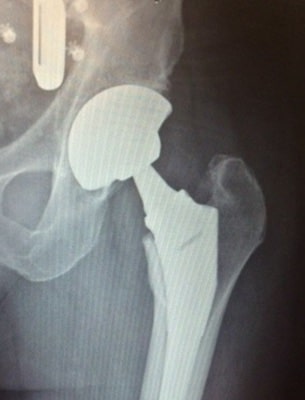
What Is A Hip Replacement?
A hip replacement is a surgical procedure that replaces the abnormal or worn surfaces of the hip joint. The surgery is typically performed to reduce hip pain from arthritis or to repair a fractured hip. In this procedure, Dr. Moore will create an artificial hip joint using a plastic-in-metal socket made of high-density polyethylene.
Conditions that lead to Hip Replacement Surgery:
Osteoarthritis of the Hip
Osteoarthritis is a degenerative type of arthritis that most often occurs in patients 50 years and older. When the cartilage of the hip begins to wear away gradually, this is Osteoarthritis of the hip joint. As the cartilage wears away by becoming rough, this decreases the joint space between the bones of the hip joint. As this occurs, X-Rays will reveal bone on bone in the joint of the hip with joint space narrowing. Osteoarthritis typically develops at a slow pace with pain increasing over time.
Avascular Necrosis
Avascular Necrosis is a condition that occurs when bone loses blood supply. Blood is required as our bones are living tissues, when the supply of blood is interrupted, the bone begins to die. If the blood loss is not stopped or treated, the bone will collapse.
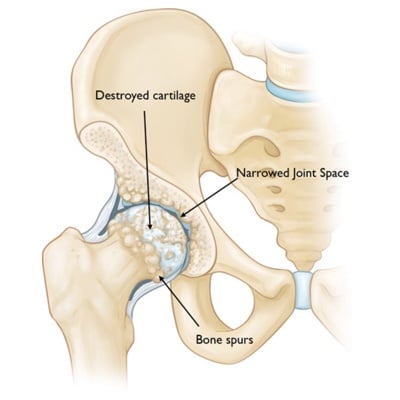
Post-Traumatic Arthritis
Avascular Necrosis is a condition that occurs when bone loses blood supply. Blood is required as our bones are living tissues, when the supply of blood is interrupted, the bone begins to die. If the blood loss is not stopped or treated, the bone will collapse.
Hip Fractures
A common cause for a total hip replacement is in the case of a fracture of the hip. Many hip fractures are managed by pin or screw fixation. However, some severe circumstances require a hip replacement because the bone itself will not heal.
When is a Hip Replacement Needed?
The decision to have a hip replacement is often one based on the patient’s complaints and pain tolerance. In the early stages of hip disease, the pain and loss of function may be improved by conservative treatment. This option can include non-steroidal anti-inflammatory agents and intra-articular injections of steroids.
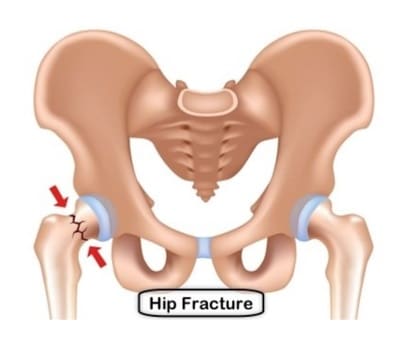
At some point, however, if the arthritic process increases in severity, patients will have increasing pain and decreasing function. At this stage, it is time to consider a total hip replacement seriously. The decision to perform the surgery is usually based entirely on the patient’s complaints.
What Are the Benefits of Total Hip Replacement?
Total hip replacement isn’t something to take lightly, but there are myriad benefits of these amazing procedures. If you’re even considering this procedure odds are you’re infrequent, if not chronic pain. You probably have trouble sleeping, especially if one hip is worse than the other and you roll onto it. You’ve probably found yourself eliminating one activity after another just to avoid the pain.
So, what’s the benefit of being able to walk around the block without pain? How fun is it to be able to take the dog for a walk yourself? What’s the benefit of comfortable nights sleeping instead of waking with a shock of pain when your hip positions the wrong way? What’s the benefit of returning to things such as playing golf or hiking?
Total hip replacement is one of the most successful operations performed in the medical world, even more, the case in the experienced hands of Dr. Moore. Hip replacement can:
- Eliminate or dramatically lessen your pain
- Restore movement
- Allow you to return to activities you love
- Reduce your risks of heart failure, depression, and type 2 diabetes
- Make everyday activities something to look forward to rather than dread
What Should I Expect With a Hip Replacement?
A hip replacement replaces the abnormal or worn surfaces of the hip joint. The specifics of the procedure depend on what type of hip replacement you need.
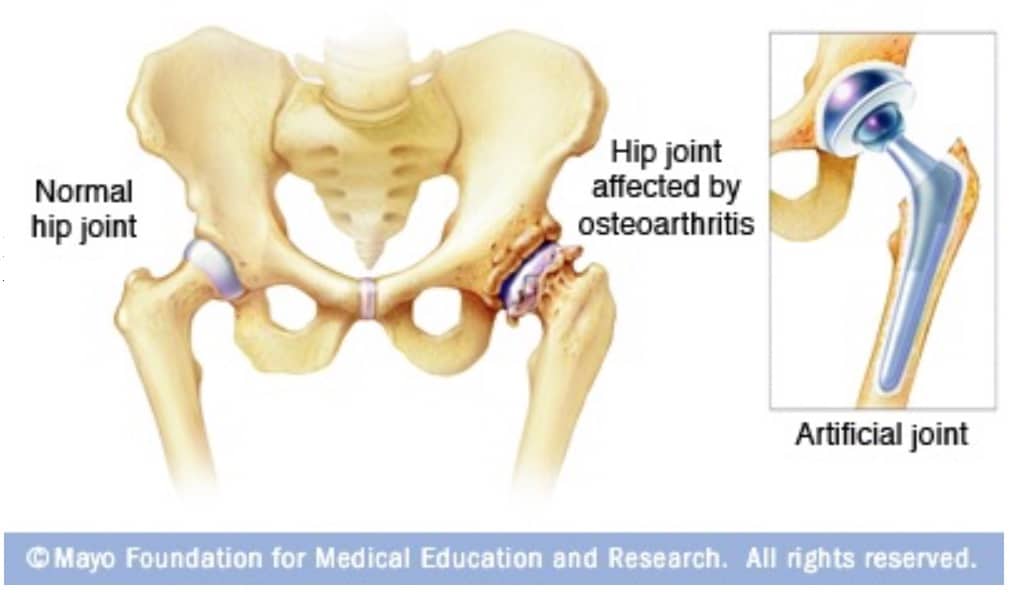
Total Hip Replacement
The process of replacing a patients diseased hip is technical and requires a skilled surgeon who has vast experience in performing total hip replacement surgeries. Dr Moore has been in practice over 25 years, performing thousands and thousands of total hip replacements.
The process of replacing a hip involves removal of the diseased femoral head. Removal of the femoral head allows Dr Moore access and visualization of the diseased acetabulum. Dr Moore will use specialized acetabular reamers to remove the diseased acetabular bone sequentially.
Once this is accomplished he will replace the disease and removed cartilage with a trabecular metal acetabular component in which your bone will grow into the porous metal component. A high grade polyethylene liner is then placed in the metal component and locked into place. At this point, Dr Moore will address the top or proximal end of the femur/the end the femoral head was removed from. He will again and sequentially use specialized femoral broaches to create an envelope that matches the femoral implant.
The implant that Dr Moore uses in the femur also has porous metal pads that your native bone will grow into. Once this part of the procedure is completed Dr Moore and his surgical team begin trialing femoral head sizes and lengths ensuring the most stable hip and equal leg lengths. Dr Moore will choose the appropriate size femoral head which will be either ceramic or titanium. Dr Moore’s patients are up and walking the day of surgery while putting full weight on their operative leg. Modern total hip replacement implants last 25-30 years.
How Long Will It Take to Fully Recover From a Hip Replacement?
Total rehabilitation after total hip replacement ranges from 6 weeks to 6 months. Patients must follow some basic posterior hip precautions for 3 months but during the first 3 months patients’ pain is fast resolving and mobility fast improving. There are some milestones to consider with recovery from total hip replacement:
- Driving – Dr Moore restricts post-operative total hip replacement patients from driving for approximately 2-4 weeks. You will not be able to drive while using narcotic pain medication.
- Walking – You will begin walking the day of your surgery putting full weight on your operative leg. Dr Moore does request post-operative patients use a walker or cane for 4 weeks after surgery.
- Showering – You may shower the day after your total hip replacement surgery. You will be discharged from your surgical site (hospital or surgery center) with and occlusive bandage over your incision. You will be sent home with additional bandages for daily showering and dressing changes.
- Work – Return to work time depends on the type of work you do, the physicality of your work, and your desire/need/ambition for returning to work. Most employers have work site specific paperwork for us to fill out. Dr Moore fills all paperwork of this type out indicating the employee will be out 12 weeks and then he determines each patients ability to return to work earlier on a patient by patient basis.
- Sex – As long as the patient is following their 3 months of posterior hip precautions, sex is not limited. Patients are provided with a booklet outlining safe sexual positions at their pre-operative appointment.
After Surgery Care, What to Expect
Surgical time for Total Hip replacement surgery can be variable with larger patients requiring more surgical time than smaller patients. Dr Moore’s average surgery time for Primary Total Hip Replacement is just under one hour from start to finish.
After your surgery is completed, you will have a short stay in our post-anesthesia care unit (PACU) and dependent upon your surgical site and discharge plan patients will either be admitted to our orthopedic unit for one night or admitted to outpatient unit for physical therapy and preparation for discharge to home.
All patients, regardless of surgical site and discharge plan, will have physical therapy the day of surgery with full weight being put on their operative leg. Patients will use a walker initially but may progress to a cane or crutches for 4 weeks. Dr Moore has all total hip replacement patients also meet with formal physical therapist prior to surgery (ideally on the day of their pre-op appointment with his APP). Patients therefor learn their hip exercises prior to surgery and then have a second PT session with a PT the day of surgery reinforcing the exercises they will need to do at home and the hip precautions they will need to follow for 3 months after surgery.
After 3 months, patients return to regular activities.
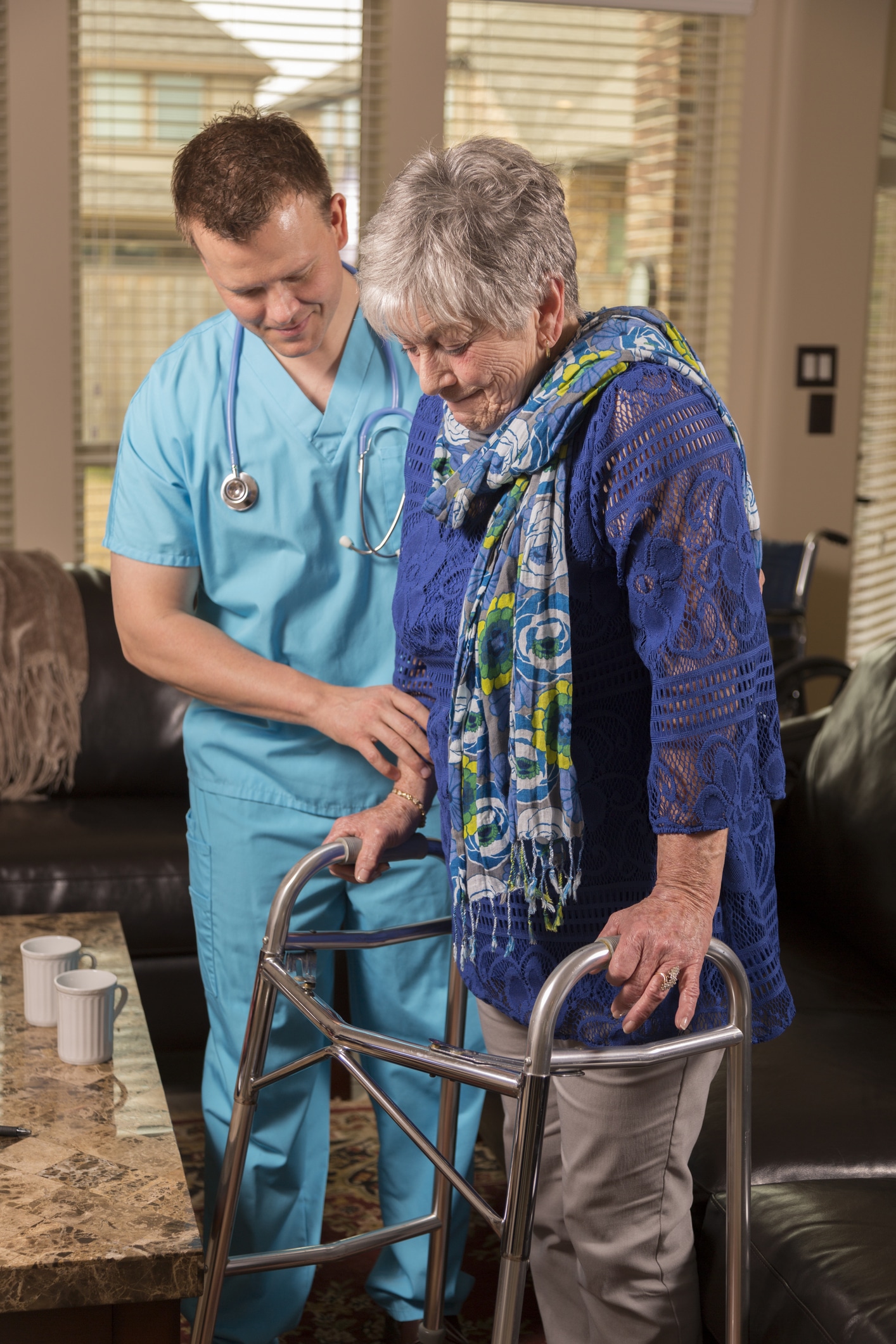
Will I Need Additional Physical Therapy After Hip Replacement?
It is unusual and atypical for patients to require additional physical therapy after total hip replacement surgery. One exception to this rule are patients with a persistent limp. Unfortunately, our brains don’t always keep pace with our bones and joints, therefore, some patients brains continue to send abnormal gait signals. In these cases, gait training is ordered to re-train the brain to walk limp free.
Is Total Hip Replacement Recovery Overly Painful?
Despite the fact that our hip joints bear constant loads except when lying down or sleeping, the pain after hip replacement is less than after knee replacement. After surgery, your pain changes from chronic aches with occasional sharp jolts of pain to the pain that accompanies wound healing, swelling, and inflammation. Hip replacement patients often report little to no pain around the 2-6-week mark.
How Long Will My Hip Replacement Last?
After your replacement surgery with Dr. Moore, you will have a dramatic reduction in pain and a significant improvement in the ability to do things such as climb the stairs. But there are things that you shouldn’t do because they will create impacts that will accelerate the normal wear and tear on the artificial components. High-impact activities such as running, jumping, and high-impact sports such as basketball and tennis will need to be avoided.
Realistic activities following total hip replacement include unlimited walking, swimming, golf, hiking, biking, dancing, and other low-impact sports.
Most artificial hip joints will last up to 25-30 years or longer, depending on how well the new joint and your bones mend. But keeping at a healthy weight is also important, as every extra pound creates more impact on the joint. If you are older than 60 when you have your hip replaced, the artificial joint will likely last the rest of your life.

What is Revision Hip Replacement?
Revision total hip replacement surgery is done on patients that have already had total hip replacement but that replacement has failed. There are various reasons that a total join replacement can fail including infection, wear of the components (early prostheses did not last as long as current, modern implants), dislocation, fracture and loosening. Should Revision surgery be required, Dr. Moore replaces failed components from the original replacement with more modern implants.
What Are the Risks and Complications of Hip Replacement?
Complications with hip replacement surgery are rare, occurring in less than two percent of patients. These are the most common complications:
- Infection — Infection can occur superficially in the wound or deep around the prosthesis. It can even occur years later, as infection from elsewhere in your body can spread to your new hip.
- Blood clots — Blood clots in the leg veins or pelvis (remove or pelvis) are one of the most common complications. If a clot breaks free and travels to your lungs, it can be life-threatening. Dr Moore mitigates this risk by putting patients on an appropriate blood thinner for a short time after surgery. Walking also helps prevent blood clots from forming.
- Leg-length inequality — The main goal of total hip replacement is pain relief. When Dr Moore completes Total Hip replacement surgery, he ensures that the replaced hip is stable (decreasing risk of dislocation). A secondary consideration is leg length restoration as often times a diseased hip translates into a shorter leg. Occasionally, in order to accomplish stability, the replaced leg is millimeters longer or shorter than the non-replaced leg. Dr. Moore makes every effort to keep your leg lengths equal, sometimes it may be necessary to shorten or lengthen the leg slightly in order to maximize the stability and biomechanics of the hip. A shoe lift can rectify this down the road if necessary.
- Dislocation — Dislocation of the hip joint is not common, but possible when patients don’t follow their hip precautions as instructed for 3 months after surgery. The 3-month period following hip precautions after surgery allows the soft tissues of the hip to heal around the hip joint itself which also helps with hip stability. Falls can also cause dislocation. Infection can also cause dislocation.
- Loosening and wear — Over time, the hip prosthesis may wear unusually or loosen. This can simply be the result of everyday impacts from normal activity, but you can exacerbate the process with high-impact activity. Tissue may also grow between the components and the bone, leading to loosening. Infection can also cause loosening.
- Metal sensitivity — As you live with your artificial hip, tiny bits of the surface of the new hip joint wear off as the ball and socket pieces rub against each other. Some people are sensitive to this metal.
Hip Replacement Success Rate
Hip replacement surgeries are very successful regarding their primary goal, pain relief. Approximately 90% of patients have complete pain relief. Most patients do not require the need for assistive devices to walk. Most patients return to their active lifestyle within 3 months of their surgery completion.
Returning to Activity After Hip Replacement
Most patients improve their activity levels significantly after surgery. Patients are encouraged to walk, hike, ride a bike or exercycle, swim, play doubles tennis and play golf. Unfortunately, we do not support sports that cause significant impact and twisting such as running, singles tennis, or downhill skiing.
Schedule Your Hip Replacement Consult Today!
For more information about Total Hip Replacement Surgery with Dr. Moore please contact our at 910.295.0224, or fill out the appointment request form on this page. Our practice looks forward to caring for you!
Patient information
- Outpatient Total Hip Replacement with Same Day Discharge (Revised Outpatient total hip replacement doc)
- Hospital Based Total Hip Replacement with One Night Hospital Stay (Revised total hip replacement doc)
- Pathway to Recovery Hip Packet
- Dental Clearance Letter (Hip)
- Medical Provider Clearance Letter (Hip)
Read what our patients are saying!
Everyone on the team was professional, caring and attentive. I really love HealthLoop and the prompt responses that you get from the staff. Great way to check-in with the patient without being “annoying”.
Click here to read more reviews.
